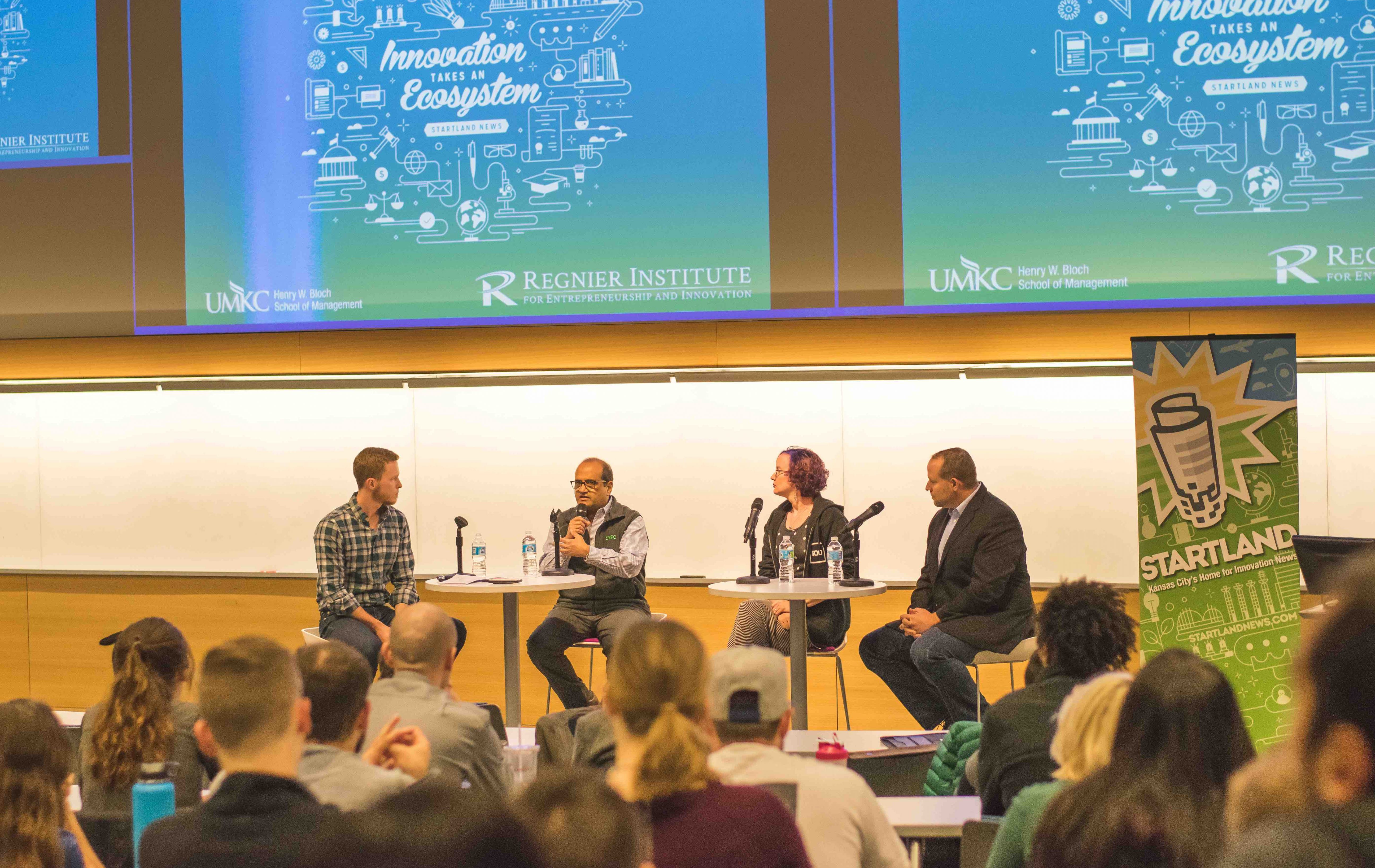For many, starting a business may sound like the dream — being your own boss, making your own rules and devising your own schedule.
But the reality is that the entrepreneurial life isn’t all sunshine and roses. Like most good things in life, it comes with risk and challenges.
And on Wednesday a panel of up-and-coming Kansas City entrepreneurs shared their wisdom on risk-taking, positive mindset and the value of networking with a crowd of about 120 aspiring entrepreneurs.
Featuring Athlete Network co-founder Chris Smith, Mycroft co-founder Kris Adair and C2FO COO Sanjay Gupta, the panel represented three firms on Startland’s Top Startups to Watch in 2017 list. Hosted by University of Missouri-Kansas City’s Regnier Institute as part of its First Wednesdays programming, the event aimed to bring students and community members together for entrepreneurial inspiration.
Here’s a bit more on what the entrepreneurs had to say.
On developing specific skills for success
When asked about the most important skills that students and aspiring entrepreneurs should develop, panelists touted flexibility, determination and passion.
Athlete Network’s Chris Smith said that there are so many skills entrepreneurs need to have that he could hardly list them, adding that he is still working on them himself.
“The book of our company hasn’t been written, and we’re writing a new chapter constantly,” Smith said. “You have to be flexible and well-versed in a lot of different aspects. You’ve got to be flexible and have a strong mind.”
To develop skills, Mycroft’s Kris Adair suggested finding entrepreneurs you admire and follow them via their blogs, book or social media. Try to hone your approach based on their values and what works.
One particular skill she added was that founders must cultivate is the candor to cut what isn’t working, including firing someone who isn’t a good fit.
“When you’re a boss, you don’t do the company any favors by keeping somebody who is not a good fit,” Adair said. “It’s like being in a bad relationship. You don’t want to continue to string that person along when you should have cut it off.”
In that vein, Adair added that being passionate about what you’re doing is important — because if you aren’t, you’ll quickly become unhappy.
“Because if you don’t love it — and I mean love, love it — it will destroy you,” Adair said. “This is hard and you have to absolutely love it, so that you can make it through the days where things are just hard and you want to just give up and call in sick.”
Gupta echoed the importance of passion while running a business. But reminded people to balance their approach with building a firm.
“Many founders spend 90 percent of their time trying to raise capital, instead of creating the product that they are creating the funds for,” Gupta said. “You’ve got to remember why you’re doing what you’re doing.”
On the value of networking
All three panelists agreed that networking is an essential — yet often misunderstood — skill.
Smith said that he wished he knew the value of it when he was just starting out.
“Most successful people actually want to help you be successful, if you’re willing to ask,” Smith said. “A lot of people will go to a networking event, meet someone and think that person’s going to do something for them. But you have to ask. Successful people love talking about themselves and it will blow your mind how many doors they can open for you with their network.”
Adair said that Mycroft wouldn’t be where it is today without her network, and said that founders can’t do it alone.
“You have to continue to go to these type of events,” Adair said. “I found a lot of stuff on Meetup.com. If it helps, wear a shirt that has your company on it or wear something funny that makes people come talk to you.”
Gupta said it’s important to be on LinkedIn, but it’s usefulness is limited. Human interaction is more valuable and no matter how successful you may become, networking never stops.
Gupta added that it’s also a game of reciprocity.
“You just can’t say enough about networking,” Gupta said. “But remember — it is a two way street.”
On the entrepreneurial mindset
Before embarking on a business, panelists said you must understand what you’re getting into. Chaotic, stressful and frustrating, entrepreneurship isn’t for everyone.
Adair describes startup life as jumping off a cliff and building an airplane on your way down.
“It really is challenging,” Adair said. “Anyone who’s done something like this knows that it takes a special determination and a lot of focus. It’s so hard and so rewarding all at the same time.”
Smith said that when you’re starting a business, there are many things that you can’t predict. He added that the grind never stops, however, even if your startup grows into a large company. As such, Smith said flexibility is key.
“(As an entrepreneur) there are constantly new things happening, and I’m getting better at adapting to it,” Smith said. “It’s a constant roller coaster that never stops. You’ve just got to roll with it and make sure you have a strong support structure.”
Whether or not you think startup life is for you, C2FO’s Sanjay Gupta reminded the crowd of about 100 attendees that the entrepreneurial spirit is necessary for any industry or occupation.
“If you’re going to be successful, you’re going to need to work hard and take responsibility,” he said. “The challenges that entrepreneurs face you will face in any occupation. The difference is, entrepreneurs have no other option — you have to make things work, otherwise you fail.”






































